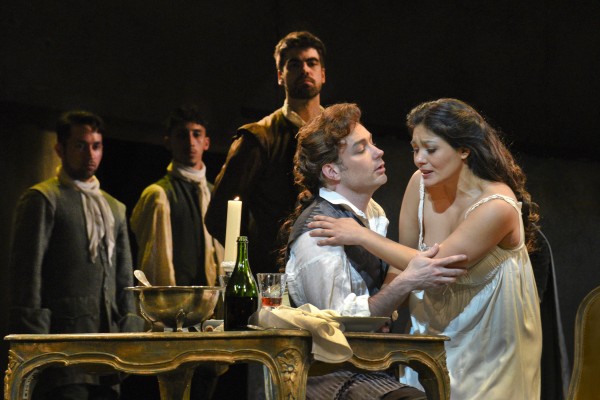
Stephen Costello and Ailyn Perez in ‘Manon.’ (Photo courtesy Karen Almond)
It was a disappointment on opening night of Manon, the Dallas Opera’s penultimate production of the season, to see more-than-expected unused seats in the orchestra — a missed opportunity for opera fans. The story is well known — about a randy 16-year-old acolyte, lured by sweet talk and kisses away from religious service and into progressively less suitable relationships — and the opera Jules Massenet’s most enduring contribution to the art. This is also only the Dallas Opera’s third presentation of Manon, and while I didn’t see the others, surely it must be the best.
Sir David McVicar’s stylized, bawdy production (re-staged here by E. Loren Meeker) maintains the original time setting (early in the court of Louis XV, just before the French aristocracy went to hell), but he gives it an exaggerated, carnival-like tone that seems very modern. He’s presenting the tale not as the corrupting of one girl, but of the inevitable corrupting influence of the whole society. It’s staged like a Restoration sex farce, with half-clothed bodies writhing in a public house, lascivious dandies lusting visibly for buxom lasses (there’s more groping than at a circuit party), exaggerated fops preening around like tweakers on a street corner. The deluge is coming, and they don’t even know it.
That makes Manon’s transformation from prim noviate to self-important socialite and obnoxious prima donna seem oh-so-familiar — meet The Real Courtesans of Versailles. There’s lots of talk of honor and respectability from a slew of degenerates who hit on their cousins and their son’s mistresses; the irony is not lost on McVicar, who adds broad moments of comedy the undercut the treacle (including an over-the-top kissing scene that could be out of a Judd Apatow movie, and the traditional ballet has all the funny vulgarity of Aristophanes). All of that imbues this production with a realness that can sometime be lost in the costumes and conceits of opera.
But the other secret weapons in this enjoyable production are the performances. Stephen Costello, who has appeared in numerous Dallas Opera productions over the last dozen years or so, has progressed from callow ingénue to expressive lyric tenor, his voice richer than before while he remains a dashing and emotive presence as De Grieux, Manon’s sincere paramour.
But even Costello gets outshone by the maelstrom that is Ailyn Perez as Manon. Her Dallas debut last fall in Great Scott introduced her as a master of comic timing housed inside a fully-realized soprano. But her Manon shows her asset as a performer of uncompromising artistic efficacy. Her rendition of her late-second scene aria (“Adieu, notre petite table”) is so plump with emotion, on opening night the audience held its collective breath, transfixed by the rawness of her singing. Perez conveyed each sigh and gasps as if they were notes meant to be sung. Her Manon gives beauty and relevance to a classic of the repertoire.
There are two more performances: Wednesday and Saturday. For tickets, visit DallasOpera.org.















